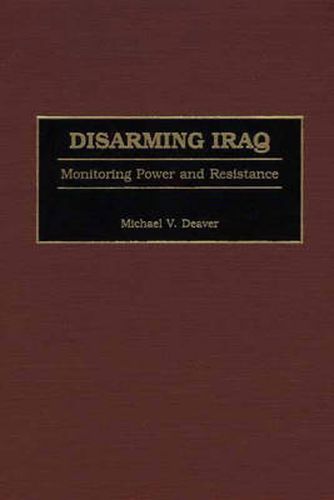Readings Newsletter
Become a Readings Member to make your shopping experience even easier.
Sign in or sign up for free!
You’re not far away from qualifying for FREE standard shipping within Australia
You’ve qualified for FREE standard shipping within Australia
The cart is loading…






Examines the power relationship between the United Nations and Iraq in the context of Iraqi resistance to imposed disarmanent from 1991 to 1998 by using sociological insights and a behavioral approach. The implementation of disarmament requirements imposed by the Security Council after Second Gulf War established a strong and unequal power relationship between the United Nations and Iraq. Although the ensuing struggle over imposed disarmament has been a major issue in world politics international relations theorists continue to ignore it. Deaver argues that this case has important theoretical implications. Using sociological insights and a behavioral approach, he examines the power relationship as well as Iraqi resistance from 1991 to 1998. Theorists are likely to find these analytic tools useful since they provide a ready means of studying the micro-foundations of power relations in generalized terms. Behavior such as supervision, surveillance, inspection, and monitoring are widespread and growing in world politics. A focus on tactics demonstrates the role of monitoring in maintaining and strengthening the relationship between the United Nations and Iraq. An analysis of dynamics makes comprehensible Iraqi losses of sovereignty and the eventual collapse of the relationship. Contrary to popular opinion, whoever escalated tensions hurt their own cause: Iraqi resistance contributed greatly to United Nations gains, while the United Nations successes led to the collapse of its relationship with Iraq.
$9.00 standard shipping within Australia
FREE standard shipping within Australia for orders over $100.00
Express & International shipping calculated at checkout
Examines the power relationship between the United Nations and Iraq in the context of Iraqi resistance to imposed disarmanent from 1991 to 1998 by using sociological insights and a behavioral approach. The implementation of disarmament requirements imposed by the Security Council after Second Gulf War established a strong and unequal power relationship between the United Nations and Iraq. Although the ensuing struggle over imposed disarmament has been a major issue in world politics international relations theorists continue to ignore it. Deaver argues that this case has important theoretical implications. Using sociological insights and a behavioral approach, he examines the power relationship as well as Iraqi resistance from 1991 to 1998. Theorists are likely to find these analytic tools useful since they provide a ready means of studying the micro-foundations of power relations in generalized terms. Behavior such as supervision, surveillance, inspection, and monitoring are widespread and growing in world politics. A focus on tactics demonstrates the role of monitoring in maintaining and strengthening the relationship between the United Nations and Iraq. An analysis of dynamics makes comprehensible Iraqi losses of sovereignty and the eventual collapse of the relationship. Contrary to popular opinion, whoever escalated tensions hurt their own cause: Iraqi resistance contributed greatly to United Nations gains, while the United Nations successes led to the collapse of its relationship with Iraq.